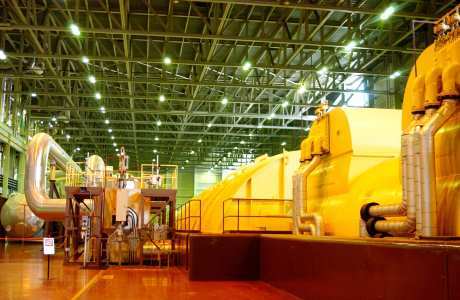A cross-party committee has called on the Canadian government to reaffirm its long-standing support for the nuclear sector, including the commercialisation of small modular reactors (SMRs). The House of Commons Standing Committee on Natural Resources made its recommendations in a report, The nuclear sector at a crossroads: Fostering innovation and energy security for Canada and the world, which it tabled before the government on 9 June.
 |
| Inside the turbine hall at Canada's Bruce B nuclear power plant (Image: Bruce Power) |
The report, which concludes a broader study on innovation, sustainable solutions and economic opportunities in the country's oil, gas, mining and nuclear sectors, is based on evidence from experts from industry, government, academia and civil society.
The 44-page document looks into: nuclear materials and facilities governance, safety and waste management; the state of the nuclear energy industry in Canada and abroad; and the future of Canadian nuclear R&D. Its seven recommendations focus on: nuclear regulatory and safety practices; R&D and innovation; the development and commercialisation of next-generation nuclear technologies; and leveraging non-power nuclear applications for national benefit, calling for the establishment of a nuclear innovation council to achieve this.
Local support for Bruce extension
Some 85% of local residents support Bruce Power's program to extend the operating periods of the Bruce nuclear units, a 6% increase from 2014, according to the latest poll carried out by the company. Residents of Bruce, Grey and Huron counties said their support was based on: jobs creation (20%), because it was "necessary" (10%), because they "like nuclear power" (8%) and because of nuclear's environmental benefits (7%). The extension program will take until 2053 to complete and will enable the eight Bruce units, which provide 30% of Ontario's electricity, to operate until 2064.
Committee chairman James Maloney said Canada had been a "bold trailblazer" in nuclear technology and research for over 70 years, and had a "proud history" of providing the "safest technology" and "unsurpassed" expertise.
Based on our study, it is clear that the federal government, working with partners in industry and other levels of government, can and must ensure that the future of the Canadian nuclear sector remain supported," he said. "The government should also make certain that researchers continue to have access to the tools needed to excel in their innovation activities."
Canada's 19 operating nuclear power reactors - 18 of them in Ontario - provide about 16% of the country's electricity. Ontario's nuclear fleet has enabled the province to completely phase out coal-fired generation, the report notes, "nearly eliminating" greenhouse gas emissions from its electricity sector.
Support for SMRs
The committee discussed three types of advanced reactors - SMRs, fusion reactors, and the integrated molten salt reactor. It recommended the country's government continues to support the development of SMRs, "recognising the potential for SMRs to provide clean and reliable power to remote and northern communities and open new areas to economically valuable resource development".
Canada's nuclear science and technology organisation, Canadian Nuclear Laboratories, recently launched a request for expressions of interest in SMRs, with the aim of demonstrating the commercial viability of such technology. The request is open until 31 July. CNL has set itself the goal of hosting a prototype SMR within the next ten years.
The standing committee comprises members of parliament from all three of Canada's major federal parties. Maloney is MP for Etobicoke-Lakeshore in Ontario.
Researched and written
by World Nuclear News







_94566.jpeg)






